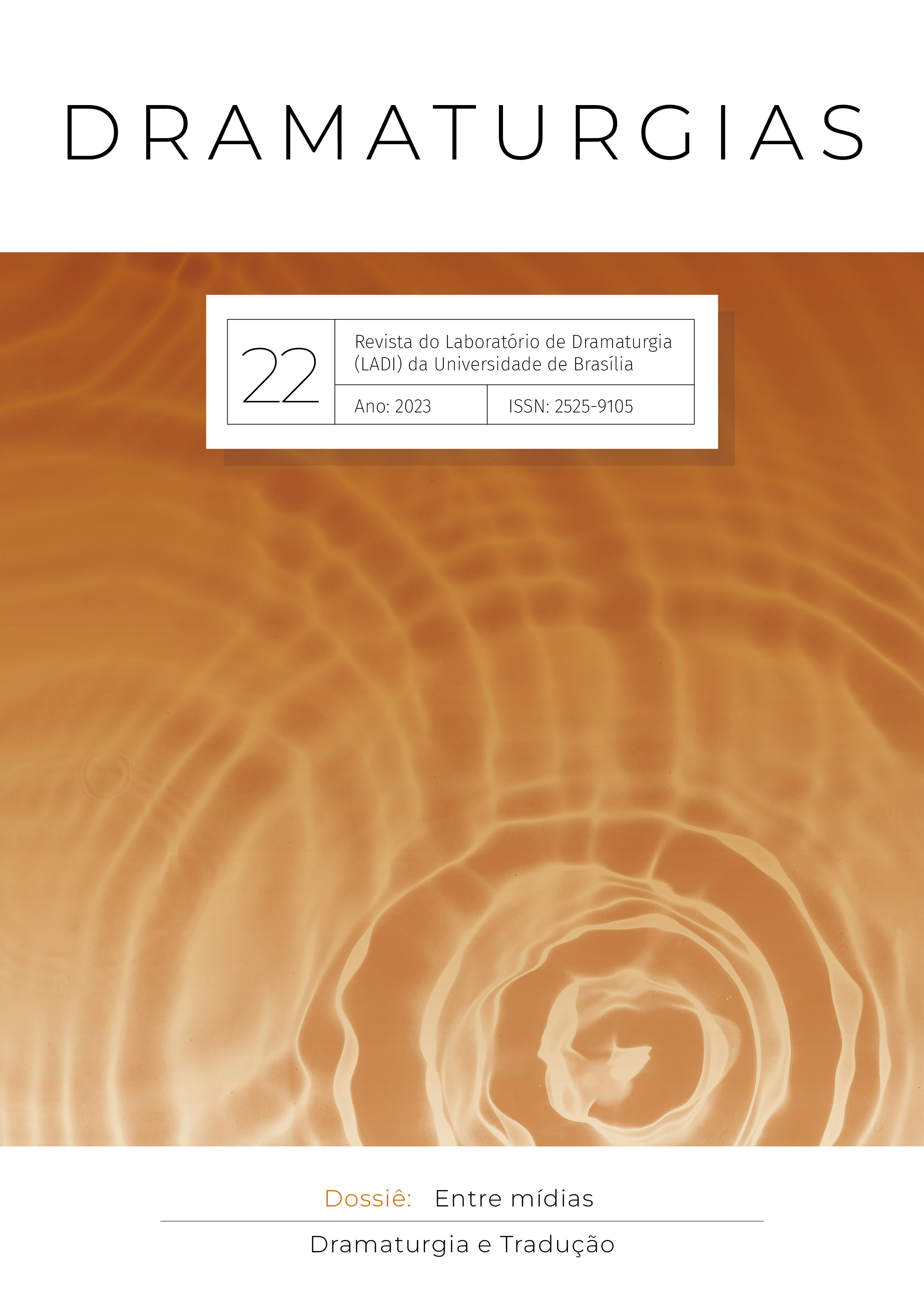Aristoxenus of Tarentum and the fragments of his works dealing with music: introductory discussion and translation of selected fragments
DOI:
https://doi.org/10.26512/dramaturgias22.48367Keywords:
Aristoxenus of Tarentum, Fragments, Pythagoreanism, Platonism, Ethos Theory.Abstract
In this brief text, i present an introduction to the study of fragments by aristoxenus of tarentum, offer translations of selected texts, and make brief comments. My general objective was to demonstrate that, in addition to the influence of the peripatetic school and aristotle, who was his teacher, aristoxenus preserved a part of his pythagorean training, which he received in his youth, and also main- tained some dialogue with platonic thought. Thus, his work goes beyond the technicality characteristic of the treatise elements of harmonic theory and en- compasses other interests such as history, biography and the influence of mu- sic on the soul.
Downloads
References
ANDERSON, W. D. Ethos and Education in Greek Music, The Evidence of Poetry and Philosophy, Cambridge (Mass.): Harvard University Press, 1966.
ANDERSON, W. D. Music and Musicians in Ancient Greece, Ítaca e Londres: Cornell University Press, 1994.
BARKER, A. Greek Musical Writings, vol. I (The Musician and his Art), Cambridge: Cambridge University Press, 1984.
BARKER, A. Greek Musical Writings, vol. II (Harmonic and Acoustic Theory), Cambridge: Cambridge University Press, 1989.
BARKER, A. The Science of Harmonics in Classical Greece. Cambridge: Cambridge University Press, 2007.
BARKER, A. Ancient Greek Writers on their Musical Past, Pisa-Roma: Fabrizio Serra, 2014.
BÉLIS, A. Aristèxene de Tarente et Aristote. Le Traité d’Harmonique. Paris: Klincksieck, 1986.
BÉLIS, A. Harmonique. IN: Brunschwig, Jacques; Lloyd, Geoffrey; Pellegrin, Pierre (eds.) Le Savoir Grec. Dictionnaire Critique, Paris: Flammarion, p. 352-367, 1996.
BURKERT, W. Lore and Science in Ancient Pythagoreanism. Tradução para inglês de Edwin L. Minar, Jr. Cambridge (Mass.): Harvard University Press, 1972.
CHAILLEY, J. La musique Grecque Antique, Paris: Les Belles Letres, 1979.
COMOTTI, G. Music in Greek and Roman Culture, Baltimore and London: Johns Hopkins University Press, 1989.
DA RIOS, R. Aristoxeni Elementa Harmonica, Roma: Typis Publicae Officinae Polygraphicae, 1954.
DAVIES, M. e FINGLASS, P. J. (eds.) Stesichorus. The poems. Cambridge: Cambridge University Press, 2014.
DORANDI, T. Rezension von: Stefan Ikarus Kaiser (Hg.): Die Fragmente des Aristoxenos aus Tarent. Neu herausgegeben und ergänzt, erläutert und übersetzt, Hildesheim: Olms 2010, in: sehepunkte 10 (2010), Nr. 5 [15.05.2010], URL: http://
www.sehepunkte.de/2010/05/17725.html. Acessado em 13/03/2023.
GENTILI, B. e PRETAGOSTINI, R. (eds.) La Musica in Grecia, Roma-Bari: Laterza, 1988.
GEVAERT, F. A. Histoire et Théorie de la Musique de l’Antiquité, 2 vols., Gand: Annoot-Braeckman, 1875-1881.
GIBSON, S. Aristoxenus of Tarentum and The Birth of Musicology. Nova York-Londres: Routeledge, 2005.
HENDERSON, I. Ancient Greek Music, IN: Wellesz, Egon (ed.) The New Oxford History of Music, Vol I, Londres-Oxford, p. 336-403, 1957.
JAN, K. von. Musici Scriptores Graeci. Leipzig: Teubner, 1899.
KAISER, S. I. Die Fragmente des Aristoxenus aus Tarent: Neu herausgegeben und ergänzt, erläutert und übersetzt. Hildesheim: Georg Olms Verlag, 2010.
LALOY, L. Aristoxène de Tarente, disciple d’Aristote, et la musique grecque, Paris: Société française d’imprimerie et de librairie, 1904; reimpressão: Genève: Minkoff, 1973.
LANDELS, J. G. Music in Ancient Greece and Rome, Londres e Nova Iorque: Routledge, 1999.
MACRAN, H. S. The Harmonics of Aristoxenus, Oxford: Clarendon, 1902; reimpressão: Hildesheim: Georg Olms Verlag, 1974.
MATHIESEN, T. J. Apollo’s Lyre. Greek Music and Music Theory in Antiquity and the Middle Ages, Lincoln e Londres: Nebraska University Press, 1999.
MERIANI, A. Sulla Musica Greca Antica, Napoli: Alfredo Guida, 2003.
MICHAELIDES, S. The Music of Ancient Greece. An Encyclopaedia, Londres: Faber and Faber, 1978.
PEARSON, L. Elementa Rhythmica: the Fragment of Book II and the Additional Evidence for the Aristoxenian Rhythmic Theory, Oxford: Clarendon, 1990.
PÉREZ CARTAGENA, F. J. Aristóxeno. Harmónica - Rítmica. IN: Urrea Méndez, Josefa; Pérez Cartagena, Francisco Javier; Redondo Reyes, Pedro. Hefestión, Métrica Griega; Aristóxeno, Harmónica - Rítmica; Ptolomeo, Harmónica. Madrid: Editorial Gredos, p. 215-365. [Biblioteca Clásica Gregos 383], 2009.
PERROT, S. Compte-rendu à Stefan Ikarus KAISER, Die Fragmente des Aristoxenos aus Tarent. Neuherausgegeben und ergänzt, erläutert und übersetzt von S. I. K. Hildesheim, Olms, 2010. 1 vol. 17 x 24 cm, XXXIX-247 p. (SPUDASMATA, 128). Disponível em https://www.persee.fr/doc/antiq_0770-2817_2011_num_80_1_3805_t16_0267_0000_2. Acessado em 13/03/2023.
ROCCONI, E. Aristoxenus, IN: Lexicon of Greek Grammarians of Antiquity. Disponível em <http://dx.doi.org/10.1163/2451-9278_Aristoxenus_it>. 2015. Acessado em 06/04/2019.
ROCHA, R. Introdução à Teoria Musical Grega: Conceitos. IN: SOARES, C. e ROCHA, R. Sobre o Afecto aos Filhos. Sobre a Música. Coimbra: Centro de Estudos Clássicos e Humanísticos, 2010. Disponível em https://digitalis-dsp.uc.pt/jspui/handle/10316.2/2389. Acessado em: 13/03/2023.
VISCONTI, A. Aristosseno di Taranto. Biografia e Formazine Spirituale, Nápoles: Centre Jean Bérard, 1999.
WEHRLI, F. Aristoxenus. Die Schule des Aristoteles, vol. 2, Basel: Schwabe, 1967.
WEST, M. L. Ancient Greek Music, Oxford: Clarendon Press, 1992.
ZANONCELLI, L. La manualistica musicale greca, (Euclide). Cleonide, Nicomaco, Excerpta Nicomachi. Bacchio il Vecchio, Gaudenzio, Alipio. Milano: Guerini Studio, 1990.
Downloads
Published
How to Cite
Issue
Section
License

This work is licensed under a Creative Commons Attribution-ShareAlike 4.0 International License.
Autores mantém os direitos autorais e concedem à revista o direito de primeira publicação, com o trabalho simultaneamente licenciado sob a Licença Creative Commons Attribution que permite o compartilhamento do trabalho com reconhecimento da autoria e publicação inicial nesta revista.



